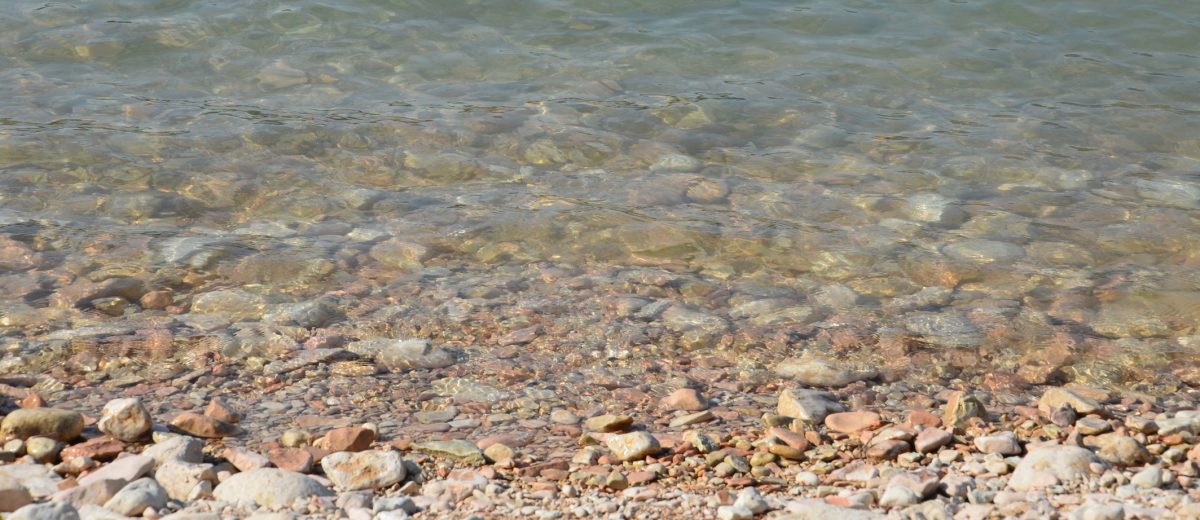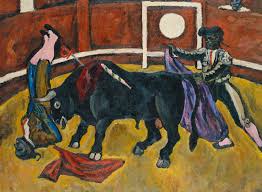I asked Nicholas whether he would agree to be interviewed in rather a ‘personal’ and targeted way. I am less interested in the writer than in the life that lies behind writing. As it happened the philosophy he revealed ( and his final summary) made it appropriately hosted on Careless Talk- the blog of things related to Involution-An Odyssey and its universal implications. So here it is.
Interview with Nicholas Rossis.
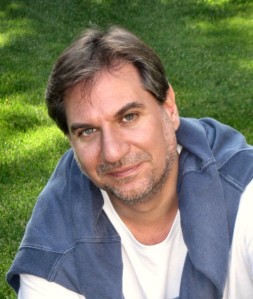
Nicholas, because I do not interview writers on any kind of regular basis, I hope you don’t mind me framing questions that arise from impressions you give me and my fascination with what underpins the individual writer, their past, their passions, their acute dislikes. Feel free to answer ‘Pass’ at any point. You have a charming on-line persona, and make many faithful friends. I would like to introduce the individual alone with yourself.
A Greek who has lived in Edinburgh and writes in English has some explaining to do.
Lol – fair enough. Framing questions from impressions is as valid a way to go as any. After all, what does any of us know about each other – even if said other is standing right next to them?
As part of my military service (compulsory in Greece), I served a year in a navy base. I met there a sailor who turned out to be a serial killer. MPs arrested him on my watch. You can imagine how shocked we all were when we found out – none of us had any idea.
Can you give a sketch of your origins; family, growing up, where? Please include an impression of the atmosphere of your childhood home.
Oh dear, this is going to be a long interview. Hope you have time!
Well, I was born in Athens, Greece. I’m an only child, although I’m told it doesn’t show. I grew up in Dionysus – a mountainous region outside of Athens. My parents moved us there because the land was inexpensive. Then, they slowly built a huge house. We lived on the top floor at first, while the rest of the house was still being built. Took them almost ten years to finish.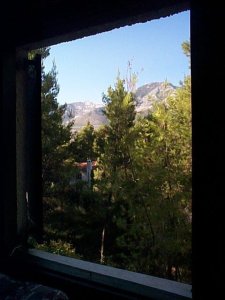
We moved there in 1981. A year to remember, for sure. At first, we had no power, phone lines or – worst of all – running water. We collected rain water in a giant tank, with a plastic pipe running into the house. Everything was done with buckets filled through that. Showering meant warming water on a gas-powered stove, then pouring it on us. We collected drinking water in gallon-sized jugs from a fresh-water spring (best water I’ve ever tasted outside of Scotland). Very wild west.
Our closest neighbour was half a mile away, which is also the distance I had to walk each day to reach the school bus. I was literally growing up in a forest. A regular Mowgli.
For power, we used a surplus US Army generator that used to be in Korea. My dad somehow found the behemoth in his engineering company and brought it home, so that we could have 2 hours of electricity each day – barely enough to warm the heaters, in a year that had us snowed in no less than 6 times. I studied with normal lamps for a couple of hours, while the generator was running, then used a gas lamp.
That summer, I saw my first forest fire. It reached less than 500 yards from our home. Oh, we had also been hit by an earthquake during that time, so the whole family (an additional 8 people) moved in with us for a week.
After a year, the water pipes finally reached our place. A few months later, power.
Phone lines were next. The road was the last to be built – we only had a dirt track running up to our place until then.
In case you’re wondering, no, the rest of Greece was firmly situated in the 20th century. It was just my crazy parents who did that. Adding insult to injury, they sent me to Greece’s poshest school. I felt like a caveman, patting snow down my fur coat while the rest of classmates gawked at me through their sunglasses (our area is some 20 degrees F colder than downtown Athens). Everyone was dressed in cool, cotton shirts, while I wore military khakis and woollen shirts. Sigh…
I still hate camping. Whenever someone suggests we rough it for a week, I always growl, “Been there, done that, got the tee-shirt, mass produced it in a sweat shop.”
Growing up in Dionysus with no siblings is definitely part of why I write. Or at least, why I love books. Every weekend, I’d borrow a dozen books from the school library and return them on Monday. Not much else to do, with no one around.
Looking back, what would you say were the repeating patterns, or passions that drove you? What or who influenced you to follow or reject?
As I explained, I was a pretty lonely child. And yet, I was reasonably popular at school – I even was class president a couple of times. It’s just that distance didn’t make it easy to hang out with a “gang.” So, loneliness is a sore point for me. I have learnt to be quite all right with it by now, and even enjoy it at times, but it’s still my greatest fear.
I believe that is why I was so keen to form romantic relationships from a relatively early age. And why we’ve stayed with Electra for so long. It is also why I took to social media and the Internet. I was one of the first people to go online in Greece, back when modems took a minute to download a small image. To me, the computer opened up an amazing way of connecting with people. My blog and my books are an extension of that need to connect; to share my world with others.
Was yours a straight path with clear markers to a manageable climb or a crooked hike through woods with a limited view ahead? Identify the signs you followed, or the boulders you circumnavigated?
I would describe my path as anything but straight. It has more turns, twists and dead ends than a David Lynch movie.
Still, I’ve come to realize lately that things happen in their own time. No matter how much I want something, if it’s meant to happen, it will, no effort needed on my part. Other times, I might desperately want something, but no matter how much effort I put into it, it just doesn’t happen – and trust me; this has happened a lot. Then again, something that I completely ignore might just flourish in front of my eyes, unexpectedly and effortlessly.
I studied civil engineering (my dad’s idea of a secure job) and in 1995 I went on to do a PhD in Digital Architecture (the only way for me to link my degree with two of my passions, design and computers). I had agreed with my supervisor on a subject about symbolism in architecture, then he, poor guy, dropped dead a week prior to my arrival. My new advisor professor not only changed my subject, but also asked me to make a website for the department, from scratch. He gave me three days to do it; days I spent reading a lot, experimented quite a bit and pulling hair, until I did it, and my first website went live at the end of the 3-day period.
I’ve been working as a web developer for almost 20 years now. I still do, partly because I have to earn a living and partly because I’ve worked so hard to create Istomedia, my company, that I feel like it’s kind of a family member. Then, a couple of years ago, I realized that I had started losing patience: with clients, projects, designs, programming, the constant need for updating and upgrading and the 6-month life cycle of everything technological. I turned to writing as a relief, and realized, startled, that it was all I wanted to do.
Every now and again, I wonder whether my studies and everything I have worked for is going to waste. But I think not: my degree has helped me to study and organize my thoughts. My PhD taught how to properly research topics, question everything, look for new and different ways to achieve a result. My work has taught me how to market my book, design its cover, create the ebook file. Indie publishing requires the same skills: presenting myself and my work to potential clients, networking, promoting my creations, finishing a project within a deadline and a budget etc.
So, at 45, life has brought me where I am. All the things I’ve done, have arguably happened because I need them today. Which is why I try to practice nowadays what Tao Te Ching calls Wei Wu Wei – actionless action: the art of setting your destination and letting life take you there. It’s a nice concept, isn’t it?
As a boy what did you want or imagine your life would entail?
Oh, wow. I haven’t thought about that in a while. As a kid, all I could think about was becoming an astronaut. Now, I dream and write about the stars and the adventures to be had among them. I guess I’m not so far off my childhood dream, after all.
You obviously make loyal on-line friends easily. What would be the qualities most important to you in close friends (men or women)?
Thanks for that – it’s kind of you to say, and I hope it’s true. I believe that people respond to my openness and honesty. More than anything, I struggle to be honest with myself; to know and accept myself, warts and all.
I also struggle to remain aligned to my nature, turning my disadvantages to advantages. For example, I do enjoy being helpful. One might wonder, “so how does help you sell your books?” The short answer is, it doesn’t. It does help make friends, though, and then they do buy my books more often than not. That’s a fringe benefit, though; not the goal.
Another thing is my belief that one has to give first, before asking for something. It’s my nature to give without expecting something in return. And I think that people respond to that. As being helpful makes me happy, I think I get the better end of the deal.
Most people fight against their nature, one way or another. They go against the grain of their personality, and occasionally end up breaking in pieces because of it. For some reason, I find it easy to pick up when people do that, and I find it tiresome. I have noticed that I am unconsciously drawn to people who are at peace with themselves. Then again, aren’t we all?
Do you ever ‘lose it’? What would occasion you to do so?
Mercifully, I haven’t “lost it” in years. In 23 years of work, I have only yelled at a client once, some five years ago. He didn’t want to pay for a job I believed was well-done, and accused me of being terrible at my work. That hurt my professional pride more than I care to admit, and I told him, in no uncertain terms, that I never want to work with him again.
So, pride. And ingratitude. Not towards me, but towards God. When I hear people who have everything curse God because He doesn’t give them everything they want, it really bugs me.
What took you to Edinburgh? Can you paint a picture of your first impressions of Britain? Have they modified and if so in what ways?
This is a funny story, actually. I met Electra when she was but 16 and I, 23. Three months later, I told my best friend that I’d marry her one day. A few months later, we walked to her parents, who were still struggling to accept me, and told them that, as soon as she finished High School, we would study together in the UK. Naturally, they shrugged it off, and just nodded, trying to hide their amusement. You could practically see them thinking, “sure, whatever.”
When we started sending out applications to various UK universities, her parents were alarmed, but said nothing. Two universities – Cardiff and Edinburgh – accepted us both. Cardiff sounded lovely, but they had accepted me as an engineer – and I preferred architecture as my PhD subject. So, Edinburgh it was.
Electra’s parents couldn’t argue – we had already given them over a year’s warning after all; hadn’t we? So, Edinburgh it was.
We arrived on what the Scots call a dreich night: wet, windy, cold and miserable. That very first night, we walked into a fish & chips to grab something to eat. The girl behind the counter asked us something. I thought I knew English, but couldn’t understand a single word. I asked her to repeat what she had said, and she did. The bulb over my head was still dim. So, I just said, “Yes.” And she poured a dark sludge over my fries, which turned out to be a vinegar-based sauce. Much later, I realized she was merely asking us, “salt and vinegar?”
We spent the first month getting acclimatized and finding a place to stay. The first thing that struck me was how polite everyone was. We were trying to find a flat once, and were walking in circles, map in hand. The number of people who stopped, unprompted, to ask if we needed assistance was jaw-slackening. I just love that kind of politeness, and miss it terribly.
On the other hand, I was shocked by the number of homeless in the streets. We practically had no homeless in the streets of Athens back then, so it was a cultural shock. Related to that is the amount of drinking. Getting drunk was socially unacceptable in Greece at the time, so that, too, was a shock.
And a pleasant surprise was how easy it was to make friends. People were really friendly and accepting, which put to bed any myths about the British (or at least the Scots) being stand-offish. Even now, our best friend is a Scot.
Of course, I’m now much more aware of the social situation in Britain – good and bad. Indeed, I consider it my second home, so I follow events there almost as closely as those in Greece.
I think you have travelled quite a lot. In an ideal situation ( enough money and no specific ties), where, apart from Greece, might you choose to live and why?
It’s so funny that you say that. Until we moved to Edinburgh, I had never been out of Greece. I consoled myself by reminding me of Socrates, who had only ventured out of Athens once – and that was to fight in a war. As a student, I was able to visit most of Europe, Mexico and Cuba. I still haven’t travelled to the Far East, but would love to do so.
I might consider living there for a few years, as I find it terribly fascinating. Plus, I’m convinced I was Chinese in a former life, as I seem to have a lot of Chinese idiosyncrasies.
Such as?
I have a strong preference for cooked rather than raw vegetables. I’ve kept a jar of coins on my desk long before I found out that to the Chinese that brings luck. And according to my Chinese friend I exemplify the characteristics of my sign ( the dog). I don’t have a waving red cat- the one thing that’s missing!
How does the current gloom about Greece, its economy, its political structures impinge on you (if it does)?
I was reading the other day a comment on a business forum. A business owner was saying that in 2014, he had bid for projects worth some 1.5 million euros. He had got almost half of that – some 700,000.In 2015, his company has only bid on projects worth 25,000. They have got 15,000 of that.
We have had a succession of anti-business governments, but this last one really put the last nail in the coffin. So, it has come to the point that I’m exploring other options, including leaving again. Which is a shame, as we have quite the nice life here. Still, I already have a pretty good offer that I’m considering, so I may not be in Greece for long.
As a Greek it must be difficult to forget the glories of ancient Greece with the Acropolis surmounting your city, and its authority being increasingly revived. How omnipresent is it, and how does or did it shape your writing of the Pearseus series?
Well, Pearseus does directly reference ancient Greece. Its concept came to me after reading Martin’s Song of Fire and Ice series, followed by Jim Lacey’s The First Clash and Herodotus’ Cyrus the Great and Rise of Persia, which describe the fatal battle on Marathon between Greece and Persia in the 5th century BC.
Marathon Bay is a 20’ drive from my home, and I’d often visited the tomb where the ancient Athenians buried their dead, so I thought at the time, “wouldn’t it be great if someone did what Martin did for medieval England, only with the story of Greece vs. Persia? And in space? How cool would that be?” Then it occurred to me: so, what’s stopping me from writing it?
I had originally chosen the title Perseus for the series, but the Scottish friend I mentioned earlier asked me if I had considered how many other books are titled Perseus on Amazon. A quick search revealed over 10,000 books with that name. Obviously, something had to change, and it occurred to me to make it Pearseus instead, using a pun about the pear-shaped spaceship to justify the change.
To return to your question, Greek history is to Greeks what oil is to some countries: a gift and a curse. It makes some Greeks act in an entitled way that drives me crazy; as if the rest of the world owes us something, just because our ancestors lived here. Like an overdue rent or something. Pure nonsense, of course.
When I stop myself from fretting over that, though, I admit it’s truly amazing to live in a place where history is never too far from the surface. And I mean that literally. During a recent fire close to my place (the price of living at a forest’s edge), a friend was helping the firefighters through the woods when he stumbled into a hole. It turned out to be a classical-age grave, rich with statuettes, pots and offerings.
Turning to your life as a writer, what, above all (apart from readers) do you want your Pearseus books to achieve, or change, or bequeath?
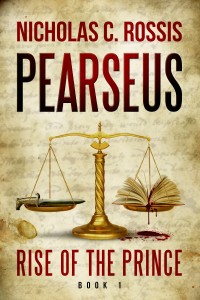
Schism is very political in nature. Rise of the Prince is basically a philosophical/religious essay masquerading as fantasy/science fiction. Mad Water and Vigil are more straight-forward adventure, where Endgame, currently penned, has a religious leader as the antagonist, which allows me to comment on the perils of following one’s religion to the extreme.
I was afraid that people would be put off by all these aspects. Some have, but many more have taken to them, even asking why later books have less introspection.
I would love it if reading Pearseus made people think about their assumptions and become more critical towards populists (Schism) and leaders (Rise). I do believe that good and evil struggle constantly all around and within us, and I wish people realized that every single one of their actions involves a choice. Even non-action is a choice. So, I hope that Pearseus reminds people to make conscious choices.
The rise of populism – both religious and political – scares me. To quote Bertolt Brecht’s prophetic “Parade of the Old New” (1939):
“I stood on the hill, where I saw the Old approaching, but it came as the New. It hobbled on new crutches that no one had ever seen before and stank of the new smell of decay that no one had ever smelled before.”
Watching the news, I find it scary just how well his words describe our current situation.
You have a fluent and extraordinary command of English, and from your posts a delight in its idiosyncrasies. Expand on that. It grabs you, tell us why.
I’m sure that Mrs. Galani, who predicted, (back in fourth grade) that I’d never learn to speak English properly, will be thrilled to hear it 😀
Seriously though, I just love the English language. I speak a bit of German, French, Russian and, of course, Greek, but English has a fluidity and openness that I find refreshing and liberating. I love playing with it in my head and on paper; exploring it; pushing it to its limits. I know that many complain about its ever-changing nature; how there are always new words, expressions and neologisms popping up. To me, that only makes it all even more precious.
I think of English as a teenager that still has years of exciting discoveries about himself ahead of him. Greece is more middle-aged in that respect. Having said that, I do google idioms on occasion, to make sure that I use them properly!
It seems that with Runaway Smile you join a number of famous men who write for children they do not (yet?) have. It has an underlying moral about the world of adults encountered by a child. What prompted it?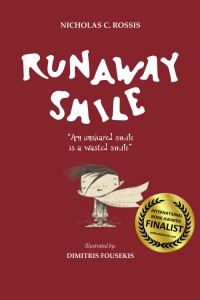
The book started out as a silly poem that I was playing with in my head (you can read the final version of it at the end of the book). One day, back in 2012, I was having my childhood friend, Dimitris Fousekis, over for lunch. Dimitris is a professional children’s books illustrator and liked the poem so much, that he suggested we turn it into a book. This was before I decided to become an author, and Pearseus had not even been conceived, mind you.
As for the moral, Smile has been described as “a humorous book with a serious moral.” Many have made similar comments, and I always wonder which moral they’re talking about. An author sits down and writes, and only later do they analyse what they have written. Or at least that’s the case with me. So, I’d be happy to share my personal take on the story, but that assumes I have got the same thing out of it as everyone else.
What prompted this caveat is a strange call from a psychologist family friend the other day. She said she loved the book, because it said exactly what she had been struggling to convey through her own unfinished book: that all men would turn into criminals if not for the mother’s love.
When I indicated that this was not my personal understanding of the story (indeed, I was rather shocked by her interpretation), she refuted me, explaining that I obviously did not understand what I had written.
For me, it’s the story of how we wake up one morning and realize that we’ve forgotten how to be happy. We seek happiness in our work, in money, in power, in humour, in knowledge… All these can offer us fun, symbolized by the false smiles worn by everyone (I’m not sure that people have noticed this, but everyone except for the boy and the mother are wearing strapped-on smiles). However, true happiness lies with sharing. With love. And sometimes we forget that, and we need someone to reach out to us and help us through this dark time of the soul.
As to what prompted it, I guess that I’ve been struggling with my own version of a mid-life crisis, where I find myself giving up a twenty year-long career to become an author. This is because my previous career no longer made me smile. Sharing my stories, however, has put the smile right back on my face!
If you were to identify the ‘essence’ of your short stories ( if you are able to ‘ see’ them from a distance) what would you say they were reaching towards, or have in common?
What is the nature of reality? Is there more to the world than we can see? Many of my stories deal with Descartes age-old question: how far can we trust our senses? With technology progressing rapidly, the time when it will be practically impossible to tell apart sensory fact from simulation can’t be far off. How will we be able to tell fantasy and reality apart? How do we know something like this hasn’t already happened, and we live in a sort of simulation?
I guess most of my stories stem from a rather Platonic view of the world; that the real world is a world of ideas somewhere out there, and this one is but its long shadow. There are so many alternative explanations to life and to the world, but we’re blind to them. Still, if someone felt the need to lift the veil of reality and take a peek behind the scenes, what would they find?
That’s why I like to start my stories with a fairly common, everyday situation, then turn it on its head. I would really love it if someone started questioning everything around them as a result of reading my stories.
In a nutshell, (or a conch) how would you summarize your personal philosophy; as in what do you believe is the reason or the purpose of the human journey?
Theosis; unification with the divine.
How he Now Lives
Nicholas Rossis lives to write and does so from his cottage on the edge of a magical forest in Athens, Greece. When not composing epic fantasies or short sci-fi stories, he chats with fans and colleagues, writes blog posts, walks his dog, and enjoys the antics of two silly cats, one of whom claims his lap as home. His children’s book, Runaway Smile, earned a finalist slot in the 2015 International Book Awards and in the 2015 IAN Book of the Year Awards. You can read it for free on his blog.
He has also written the epic fantasy series,Pearseus. The final book in the series is currently penned and expected in fall 2015.
Many of his short stories have appeared on various collections and anthologies. He has published The Power of Six, a collection of short sci-fi stories that includes his award-winning short story, I Come in Peace, and Infinite Waters, a collection of short speculative fiction stories.
Nicholas is all around the Internet, but the best place to connect with him would be on his blog, http://nicholasrossis.me/

